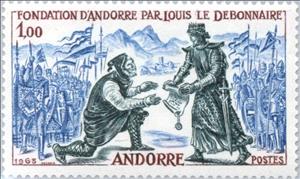Stamp: Transfer of the founding-parchment by Louis the Pious (Andorra, French Administration 1963)
Transfer of the founding-parchment by Louis the Pious (Andorra, French Administration 1963)
22 June (Andorra, French Administration ) within release History goes into circulation Stamp Transfer of the founding-parchment by Louis the Pious face value 1 French franc
| Stamp Transfer of the founding-parchment by Louis the Pious in catalogues | |
|---|---|
| Yvert et Tellier: | Yt:AD-FR 169 |
| Michel: | Mi:AD-FR 181 |
Stamp is square format.
Also in the issue History:
- Stamp - Folk dance group at the Sardana Dance face value 0.20;
- Stamp - Charlemagne crossed Andorra with his army face value 0.50;
- Stamp - Transfer of the founding-parchment by Louis the Pious face value 1;
Stamp Transfer of the founding-parchment by Louis the Pious it reflects the thematic directions:
A flag is a piece of fabric (most often rectangular or quadrilateral) with a distinctive design that is used as a symbol, as a signaling device, or as decoration. The term flag is also used to refer to the graphic design employed, and flags have since evolved into a general tool for rudimentary signalling and identification, especially in environments where communication is similarly challenging (such as the maritime environment where semaphore is used). National flags are patriotic symbols with varied wide-ranging interpretations, often including strong military associations due to their original and ongoing military uses. Flags are also used in messaging, advertising, or for other decorative purposes. The study of flags is known as vexillology, from the Latin word vexillum, meaning flag or banner.
Commemorations are a type of religious observance in the many Churches of the Anglican Communion, including the Church of England. They are the least significant type of observance, the others being Principal Feasts, Principal Holy Days, Festivals, and Lesser Festivals. Whereas Principal Feasts must be celebrated, it is not obligatory to observe Commemorations. They are always attached to a calendar date, and are not observed if they fall on a Sunday, in Holy Week, or in Easter Week. In Common Worship Commemorations are not provided with collects or indications of liturgical colour. However, they may be celebrated as Lesser Festivals if local pastoral conditions suggest it.
An anniversary is the date on which an event took place or an institution was founded in a previous year, and may also refer to the commemoration or celebration of that event. For example, the first event is the initial occurrence or, if planned, the inaugural of the event. One year later would be the first anniversary of that event. The word was first used for Catholic feasts to commemorate saints. Most countries celebrate national anniversaries, typically called national days. These could be the date of independence of the nation or the adoption of a new constitution or form of government. The important dates in a sitting monarch's reign may also be commemorated, an event often referred to as a "Jubilee".



